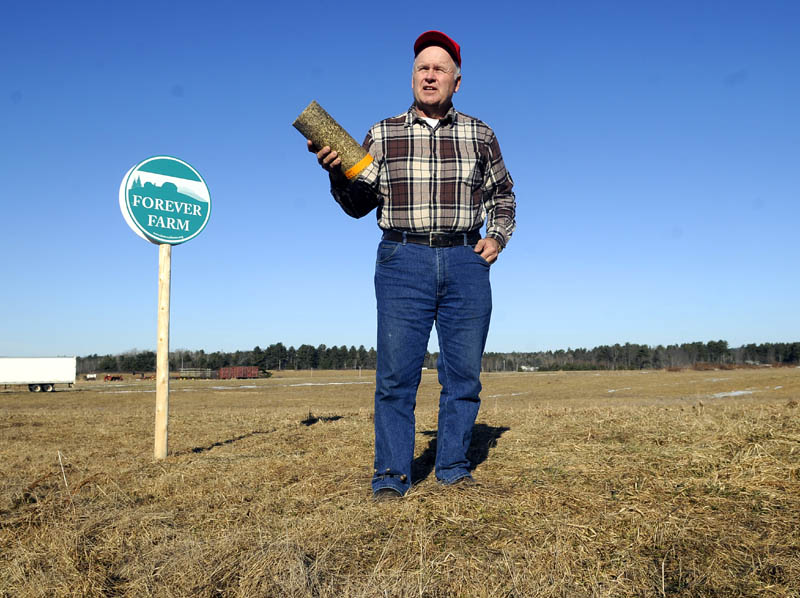VASSALBORO — Peter Bragdon proudly showed off his prototype “hay log” at the kitchen table.
Bragdon, who has been haying for 30 years on his 170-acre farm, said his hay log — a solid fuel that can be burned in place of wood in furnaces, stoves, fire pits, chimeras and camp fires — is good news for farmers.
The production of the tightly compressed 4-by-12-inch grassy logs will be an outlet for their excess hay.
“Hay is used for feed, but if you have a thunderstorm the feed value is gone, so the price plummets,” Bragdon said. “The idea is you always have hay. When it rains on it and the price is low you try and think of ways to make a better product and get more money for it. Using it here is the answer. Farmers can sell it to me and it will help them keep their farms.”
Bragdon said farmers are hanging on by a thread because of rising costs. The hay log technology has the potential to add significant value to hay that cannot be sold as animal feed, he said.
Bragdon sells his hay mostly in Massachusetts and New Hampshire to horse stables and feed stores. His yield is 30,000 bales of hay a year.
He said wet weather ruins a quarter of his feed crop every year. He said some summers it has rained so much he has lost more than half of his crop.
When that happens, Bragdon said the nutritional value of hay is reduced and the price of a bale depreciates from $4 to $2.
He said the $2 bails would only be good as mulch on the side of the road. Farmers often dispose of the damp hay by burning it in the field.
Now, that hay can be turned into sustainable energy.
Bragdon found out in June that he is the recipient of a $26,751 grant to conduct a feasibility study on converting low-quality hay from the farm into logs for use in home heating. Funding is made available through the U.S. Department of Agriculture Rural Development Assistance under the Value-Added Producer Grant program.
USDA Rural Development State Director Virginia Manuel said she is pleased a Maine farm received the grant.
“These awards will help small businesses foster ingenuity and enterprise at their operations, helping to sustain them while allowing them to expand their horizons, create opportunities, and grow,” Manuel said.
Bragdon said he also received a $12,500 seed grant from the Maine Technology Institute.
Betsy Biemann, president of the Maine Technology Institute, said grants provide critical funding that helps Maine entrepreneurs develop ideas based on promising technologies.
She said applications are reviewed by individuals with technology and business backgrounds and are highly competitive, as only one in three or four proposals are typically funded.
“The goal is to encourage Maine businesses to undertake projects like these and help them to advance their new technologies to the market, generating economic growth and job creation across Maine,” she said.
Bragdon is still waiting for his patent to turn hay into logs, an idea that came to him while driving his tractor.
“When you’re on a tractor 10-12 hours a day, you have a lot of time to think,” he said.
Bragdon said a farm yields about 100 bales per acre. It takes one bale of hay to produce eight logs, which are compressed like wood pellets and include three other ingredients with different British thermal unit values, which he wouldn’t disclose.
“It’s the same idea as pellets, except they’re all wood,” he said. The hay logs “will burn about three hours. We did a BTU test. Wood has a 48 percent moisture content and the hay log is six to eight. So, you get more BTU per pound.”
Bragdon said he hopes to qualify for more grants and will apply for a small business loan to build a place to manufacture the logs on his Hannaford Hill Road farm and buy the equipment.
His Maine business, which would eventually expand into other states with the help of a website, would provide jobs to five people. He hopes to be up and running by fall of next year.
The price of his logs still hasn’t been determined.
“We’re just getting set up and are trying to get all the bugs out of it,” he said. “Then, after that, we’ll go after the market. There’s two things I want: A good quality product and decent price.”
Mechele Cooper — 621-5663
mcooper@centralmaine.com
Send questions/comments to the editors.



Success. Please wait for the page to reload. If the page does not reload within 5 seconds, please refresh the page.
Enter your email and password to access comments.
Hi, to comment on stories you must . This profile is in addition to your subscription and website login.
Already have a commenting profile? .
Invalid username/password.
Please check your email to confirm and complete your registration.
Only subscribers are eligible to post comments. Please subscribe or login first for digital access. Here’s why.
Use the form below to reset your password. When you've submitted your account email, we will send an email with a reset code.